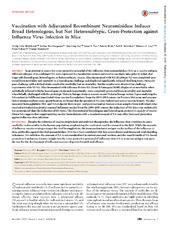Vaccination with adjuvanted recombinant neuraminidase induces broad heterologous, but not heterosubtypic, cross-protection against influenza virus infection in mice
Wohlbold, Teddy John; Nachbagauer, Raffael; Xu, Haoming; Tan, Gene S.; Hirsh, Ariana; Brokstad, Karl Albert; Cox, Rebecca Jane; Palese, Peter; Krammer, Florian
Peer reviewed, Journal article
Published version

Åpne
Permanent lenke
https://hdl.handle.net/1956/11827Utgivelsesdato
2015-03-10Metadata
Vis full innførselSamlinger
Originalversjon
https://doi.org/10.1128/mbio.02556-14Sammendrag
In an attempt to assess the cross-protective potential of the influenza virus neuraminidase (NA) as a vaccine antigen, different subtypes of recombinant NA were expressed in a baculovirus system and used to vaccinate mice prior to lethal challenge with homologous, heterologous, or heterosubtypic viruses. Mice immunized with NA of subtype N2 were completely protected from morbidity and mortality in a homologous challenge and displayed significantly reduced viral lung titers. Heterologous challenge with a drifted strain resulted in morbidity but no mortality. Similar results were obtained for challenge experiments with N1 NA. Mice immunized with influenza B virus NA (from B/Yamagata/16/88) displayed no morbidity when sublethally infected with the homologous strain and, importantly, were completely protected from morbidity and mortality when lethally challenged with the prototype Victoria lineage strain or a more recent Victoria lineage isolate. Upon analyzing the NA content in 4 different inactivated-virus vaccine formulations from the 2013-2014 season via Western blot assay and enzyme-linked immunosorbent assay quantification, we found that the amount of NA does indeed vary across vaccine brands. We also measured hemagglutinin (HA) and NA endpoint titers in pre- and postvaccination human serum samples from individuals who received a trivalent inactivated seasonal influenza vaccine from the 2004-2005 season; the induction of NA titers was statistically less pronounced than the induction of HA titers. The demonstrated homologous and heterologous protective capacity of recombinant NA suggests that supplementing vaccine formulations with a standard amount of NA may offer increased protection against influenza virus infection.
